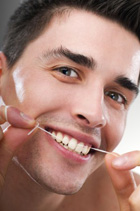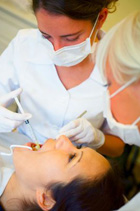 There is no need to be ashamed of your personal appearance, especially your teeth. If you are wary of smiling because of your old metallic fillings or suffer from the pain of cavities, cosmetic bonding is for you. Advances in technology mean that the days of unsightly metal fillings are at an end. In just a single session you can have a perfect smile thanks to cosmetic bonding techniques which allow cavities to be filled with tooth-coloured composite.
There is no need to be ashamed of your personal appearance, especially your teeth. If you are wary of smiling because of your old metallic fillings or suffer from the pain of cavities, cosmetic bonding is for you. Advances in technology mean that the days of unsightly metal fillings are at an end. In just a single session you can have a perfect smile thanks to cosmetic bonding techniques which allow cavities to be filled with tooth-coloured composite.
Whether you have an existing metal filling which you wish to have replaced or you need to have a cavity filled, incredible cosmetic bonding technology is now available in Leeds. Utilising dental composite, a mouldable substance made of acrylic resin and fillers, cosmetic bonding will solve your cavity problems and produce aesthetically pleasing results.
Your dentist will select the appropriate shade of bond to match your surrounding teeth and, having cleaned the area of tartar and debris, will apply an adherent gel. The bond is applied in one go or layered on gradually to achieve the optimum texture and shade before being subjected to a curing light. Buffing and polishing complete the procedure and allows a smooth finish. The result is an almost invisible filling, the durability of which represents a great advance in dentistry.
It’s that simple to have your cavity problems solved and you will never have to worry about the look of metal fillings or your painful cavities again. The lengthy processes of metal filling are now a thing of the past so contact your Leeds dentist today about cosmetic bonding procedures and be astonished with the results.





 Chewing gums benefits can be substantial to our oral health. Whether it is to freshen breath or contribute to increased production of saliva, many of us chew gum. Saliva is a vital force in protecting our teeth from the damaging effects of plaque and chewing gum is one of the simplest ways to achieve that.
Chewing gums benefits can be substantial to our oral health. Whether it is to freshen breath or contribute to increased production of saliva, many of us chew gum. Saliva is a vital force in protecting our teeth from the damaging effects of plaque and chewing gum is one of the simplest ways to achieve that. Imagine being able to have your false tooth fitted in a single visit to your dentist. In the past this process could take a fortnight or more, but CEREC technology has changed all that, allowing dentists to design, construct and fit new crowns, veneers, onlays and underlays in just one session. Achieve lasting results with this efficient procedure available in the City of Leeds.
Imagine being able to have your false tooth fitted in a single visit to your dentist. In the past this process could take a fortnight or more, but CEREC technology has changed all that, allowing dentists to design, construct and fit new crowns, veneers, onlays and underlays in just one session. Achieve lasting results with this efficient procedure available in the City of Leeds. Maintaining your home oral hygiene routine is vital in maintaining healthy teeth and gums. Six month check ups with your dentist are very important, as is pursuing a balanced diet, but in the mean time it is crucial that you take good care of your teeth at home by brushing and flossing.
Maintaining your home oral hygiene routine is vital in maintaining healthy teeth and gums. Six month check ups with your dentist are very important, as is pursuing a balanced diet, but in the mean time it is crucial that you take good care of your teeth at home by brushing and flossing. Crooked, misaligned teeth have many causes, from trauma to childhood thumb-sucking. They can dash one’s confidence and lead to a lifetime of poor oral hygiene. Central Leeds dentists are now offering a chance to put an end to this forever with the fitting of braces. Why delay achieving your perfect smile? Braces work with your teeth to ensure lasting, optimum alignment and bite that will mean you can show off your teeth with confidence.
Crooked, misaligned teeth have many causes, from trauma to childhood thumb-sucking. They can dash one’s confidence and lead to a lifetime of poor oral hygiene. Central Leeds dentists are now offering a chance to put an end to this forever with the fitting of braces. Why delay achieving your perfect smile? Braces work with your teeth to ensure lasting, optimum alignment and bite that will mean you can show off your teeth with confidence. Maintaining healthy gums is just as vital for oral hygiene as looking after your teeth. With experts suggesting that as many as seventy five per cent of Britons over thirty five years of age have some form of gum disease it has never been more important to take your gum’s health seriously. Bleeding gums are a sign that gum disease is taking hold and you should contact your Central Leeds dentist immediately if you notice it occurring.
Maintaining healthy gums is just as vital for oral hygiene as looking after your teeth. With experts suggesting that as many as seventy five per cent of Britons over thirty five years of age have some form of gum disease it has never been more important to take your gum’s health seriously. Bleeding gums are a sign that gum disease is taking hold and you should contact your Central Leeds dentist immediately if you notice it occurring. Under normal circumstances the roots and ligaments which hold your primary or baby teeth in place will dissolve and allow your adult teeth to come through and replace them. Sometimes they don’t dissolve properly and end up fused with your jaw bone. This condition is called ankylosis and should be treated as soon as it is diagnosed.
Under normal circumstances the roots and ligaments which hold your primary or baby teeth in place will dissolve and allow your adult teeth to come through and replace them. Sometimes they don’t dissolve properly and end up fused with your jaw bone. This condition is called ankylosis and should be treated as soon as it is diagnosed. It is the job of an oral pathologist to diagnose disease in the mouth and recommend immediate treatment, writes a dentist in Leeds. The mouth is an important gateway to the body. Hence, maintaining its health and being able to recognise the causes of oral diseases are paramount. Bad oral hygiene, diet, poor immune systems, stress, smoking and heavy drinking can put extreme stresses on the mouth. It can start with plaque and tartar, leading to tooth decay, gum infections, periodontal and salivary disease- abscesses and lesions can develop, as well as oral cancer. If there are any signs of problems, it is the pathologist’s role is carry out extensive examinations using x-rays, radiographs, dental imaging, biopsies and biochemical examinations of the oral and maxillofacial regions in order to come to a precise diagnosis of the disease and then design a course of treatment. This often involves surgery and the pathologist will work closely with other specialists such as orthodontists, endodontists and periodontists to ensure that the best procedures lead to the best results for the patient.
It is the job of an oral pathologist to diagnose disease in the mouth and recommend immediate treatment, writes a dentist in Leeds. The mouth is an important gateway to the body. Hence, maintaining its health and being able to recognise the causes of oral diseases are paramount. Bad oral hygiene, diet, poor immune systems, stress, smoking and heavy drinking can put extreme stresses on the mouth. It can start with plaque and tartar, leading to tooth decay, gum infections, periodontal and salivary disease- abscesses and lesions can develop, as well as oral cancer. If there are any signs of problems, it is the pathologist’s role is carry out extensive examinations using x-rays, radiographs, dental imaging, biopsies and biochemical examinations of the oral and maxillofacial regions in order to come to a precise diagnosis of the disease and then design a course of treatment. This often involves surgery and the pathologist will work closely with other specialists such as orthodontists, endodontists and periodontists to ensure that the best procedures lead to the best results for the patient.

